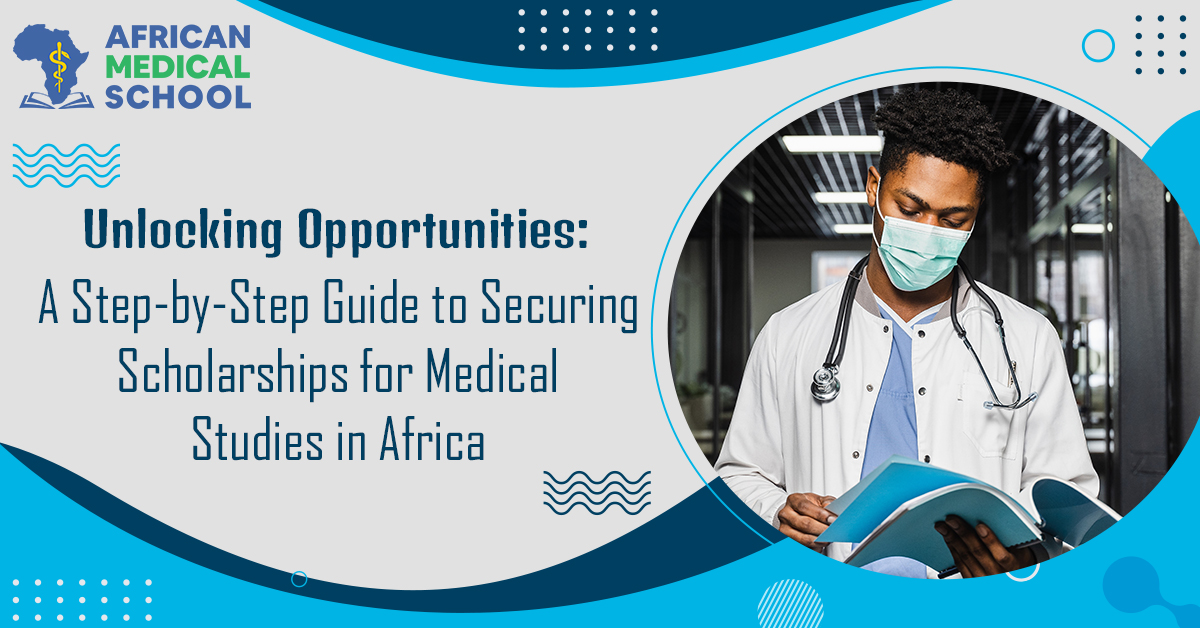|
|
Blog Summary
- Why Study Medicine in Africa?
- Benefits of Scholarships for Medical Studies
- Researching the Best Universities in Africa
- Understanding Scholarship Programs
- Eligibility Criteria and Application Process
- Crafting a Compelling Personal Statement
- Navigating Scholarship Interviews
- Leveraging Networking Opportunities
- Overcoming Challenges and Rejections
- Scholarships for Specific Medical Specializations
- Conclusion
- FAQs (Frequently Asked Questions)
Why Study Medicine in Africa?
The continent of Africa holds great promise and boasts an abundance of varied cultures and resources. It offers a unique learning experience for aspiring medical professionals. By studying medicine in Africa, one can have the chance to encounter a diverse range of medical cases, such as tropical diseases and unique healthcare obstacles. Additionally, Africa’s culturally vibrant communities offer a rich social and educational environment, fostering personal growth and intercultural competence.
Benefits of Scholarships for Medical Studies
Securing a scholarship for medical studies in Africa comes with numerous advantages. These scholarships alleviate the financial burden associated with pursuing higher education. By covering tuition fees, accommodation, and other expenses, scholarships make quality medical education more accessible. Moreover, scholarships often provide additional benefits such as mentorship programs, networking opportunities, and exposure to cutting-edge research, further enhancing your academic journey.
Researching the Best Universities in Africa
When researching the best universities in Africa for medical studies, consider institutions like the University of Cape Town, Texila American University Zambia, Makerere University, and the University of the Witwatersrand. These universities have a strong reputation for their medical programs, faculty expertise, and research opportunities. Look for universities that offer a comprehensive curriculum, state-of-the-art facilities, and a supportive learning environment. Consider factors such as student-to-faculty ratio, clinical exposure, international collaborations, and alumni success stories.
- Explore university rankings, online forums, and official websites to gather information about each institution’s academic reputation and student satisfaction.
- Seek advice from professionals in the medical field, current students, and alumni to gain insights into the universities’ strengths and weaknesses.
- Choose a university that aligns with your academic and career goals and provides the resources and opportunities you need to excel in your medical studies.
Understanding Scholarship Programs
Before diving into the scholarship application process, it’s essential to understand the various scholarship programs available. Governments, private organizations, or international bodies can fund scholarships. Each program may have its own specific requirements and selection criteria. By familiarizing yourself with different scholarship programs, you can narrow your options and focus on those that best suit your needs.

Eligibility Criteria and Application Process
To qualify for scholarships, it’s essential to meet the eligibility criteria set by the respective scholarship programs. These criteria may include academic performance, leadership qualities, extracurricular involvement, community service, and more. By carefully reviewing the eligibility requirements, you can assess your qualifications and determine your chances of securing a scholarship.
The process of applying for scholarships can differ based on the specific program. It typically involves submitting an online application form and supporting documents such as academic transcripts, recommendation letters, and a personal statement. Pay close attention to application deadlines and ensure you provide all the required information accurately and promptly. In Africa, many universities provide scholarships, so you should check those universities for opportunities to support your medical career. African Medical Schools can assist you in finding the best medical school that suits your needs!
Crafting a Compelling Personal Statement
- Use your statement to showcase your passion for medicine, unique experiences, and commitment to making a difference in healthcare.
- Highlight your academic achievements, relevant extracurricular activities, and any research or volunteer work demonstrating your dedication and suitability for the scholarship.
- Be authentic and genuine in sharing your personal story, emphasizing how your background and experiences have shaped your desire to pursue a medical career.
- Keep your statement concise, focusing on your journey’s most impactful and relevant aspects and aspirations.
- Use vivid language, rhetorical questions, and personal anecdotes to engage the reader and make your statement memorable.
- Edit and proofread your statement carefully to ensure it is free of errors and effectively communicates your passion and qualifications.
Navigating Scholarship Interviews
Some scholarship programs may require interviews to assess candidates further. Prepare for these interviews by researching common interview questions, practicing your responses, and showcasing your passion and commitment to medicine. Be confident, articulate, and attentive during the interview process to leave a lasting impression on the interviewers.
Leveraging Networking Opportunities
Leveraging networking opportunities is essential when seeking scholarships for medical studies in Africa. Attending conferences, seminars, and workshops that relate to your area of interest is a great way to connect with professionals and experts in the medical field. Networking through events and connections with colleagues provides valuable learning opportunities and informs individuals of industry developments and trends. Engage in conversations, ask questions, and actively participate in networking events to build meaningful connections and expand your professional network. Join online platforms and communities where you can interact with like-minded individuals, share knowledge, and stay updated on scholarship opportunities.
Seek mentorship from experienced professionals who can guide, advise, and write strong recommendation letters for your scholarship applications. Collaborate with fellow students and professionals on research projects or community service initiatives, as these collaborative efforts can enhance your scholarship application. Remember, networking is not just about what others can do for you but also about how you can contribute to the medical community and build lasting relationships that benefit both parties.
Overcoming Challenges and Rejections
View setbacks as opportunities for growth and learning, and maintain a resilient mindset throughout your journey. Seek feedback from mentors, scholarship advisors, or professionals to identify areas of improvement and refine your application strategy. Take the time to reflect on your experiences, identify lessons learned, and make necessary adjustments to strengthen your future applications. Stay persistent and apply to various scholarships, as each rejection brings you closer to finding the right opportunity.
Utilize resources and support networks available, such as career services, scholarship databases, and workshops, to enhance your chances of success. The right approach to facing challenges and overcoming rejections is vital for those aspiring to attend top medical schools in Africa.
Scholarships for Specific Medical Specializations
Whether you aspire to become a cardiologist, neurosurgeon, or pediatrician, scholarship opportunities are available to support your chosen medical path. These scholarships often offer financial assistance, mentorship programs, and research opportunities tailored to your specialization. Research specialized scholarship programs in your desired medical field to identify opportunities that align with your academic and career goals. Take advantage of these specialized scholarships to gain in-depth knowledge, access cutting-edge research, and receive guidance from experts in your field.
Conclusion
Securing a scholarship for medical studies in Africa can be a life-changing opportunity. It opens doors to quality education, cultural immersion, and professional growth. By adhering to the detailed instructions provided in this article, you can easily navigate the scholarship application process and boost your likelihood of unlocking opportunities for a thriving medical career in Africa.



15 Comments. Leave new
Engage in conversations, ask questions, and actively participate in networking events to build meaningful connections and expand your professional network. Join online platforms and communities where you can interact with like-minded individuals, share knowledge, and stay updated on scholarship opportunities. Ok-Life-Accident-and-Health-or-Sickness-Producer Exam Questions
Thanks for sharing. I read many of your blog posts, cool, your blog is very good.
I like playing at ph444onlinecasino. They have a lot of cool games. Maybe this can be my lucky night, let see. Come and play: ph444onlinecasino
Bigbet1 is growing on me. The interface is clean and there are lots of ways to win. Giving it a thumbs up! Visit bigbet1
Thank you for your sharing. I am worried that I lack creative ideas. It is your article that makes me full of hope. Thank you. But, I have a question, can you help me? https://www.binance.info/register?ref=IHJUI7TF
GMC Slot, heard good things. The graphics are top-notch. Might be worth a spin or two if you’re feeling lucky: gmc slot.
Just tried my luck at 567win1 and had a blast. Graphics are sharp and the payouts seem fair. Gotta love a site that feels straightforward. Check it out 567win1 for some fun!
Okay, jjwinlogin makes it so easy to jump right into the games. The login process is a breeze. I’m all about it! jjwinlogin
888slot là điểm đến lý tưởng cho những ai đang tìm kiếm sự kết hợp giữa giải trí đỉnh cao và cơ hội sinh lời bền vững. Chúng tôi luôn minh bạch trong việc công bố tỷ lệ thắng cược, giúp người chơi dễ dàng xây dựng chiến thuật cá nhân hiệu quả. TONY01-29O
I don’t think the title of your article matches the content lol. Just kidding, mainly because I had some doubts after reading the article.
Can you be more specific about the content of your article? After reading it, I still have some doubts. Hope you can help me. https://accounts.binance.com/register-person?ref=IHJUI7TF
Feeling lucky tonight! Saw the 777publink and had to check it out. Let’s hope the 7s are on my side! Fingers crossed! Link here: 777publink
PHJoin22, saw this trending lately. Anyone tried it? Is it legit? Kinda curious now. Maybe I’ll give it a small try and see how things go. Wanna test my luck over at phjoin22.
888Taya777, feeling lucky today! Saw some testimonials online. Maybe I’ll deposit a small amount. Bahala na si Lord! Wish me luck over at 888taya777!
Thanks for sharing. I read many of your blog posts, cool, your blog is very good.